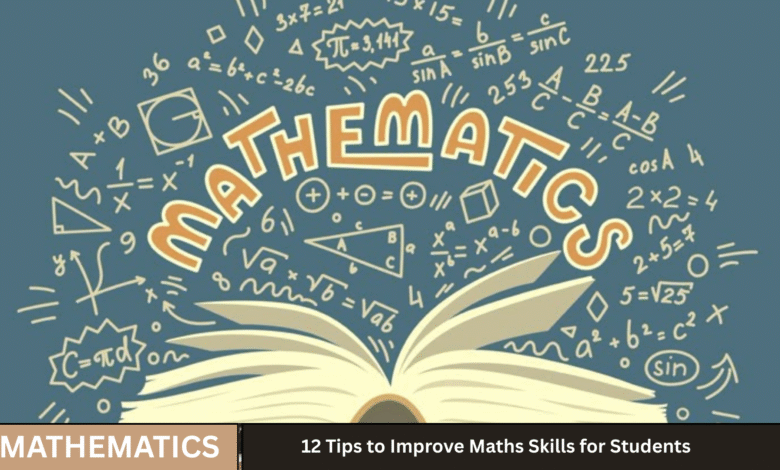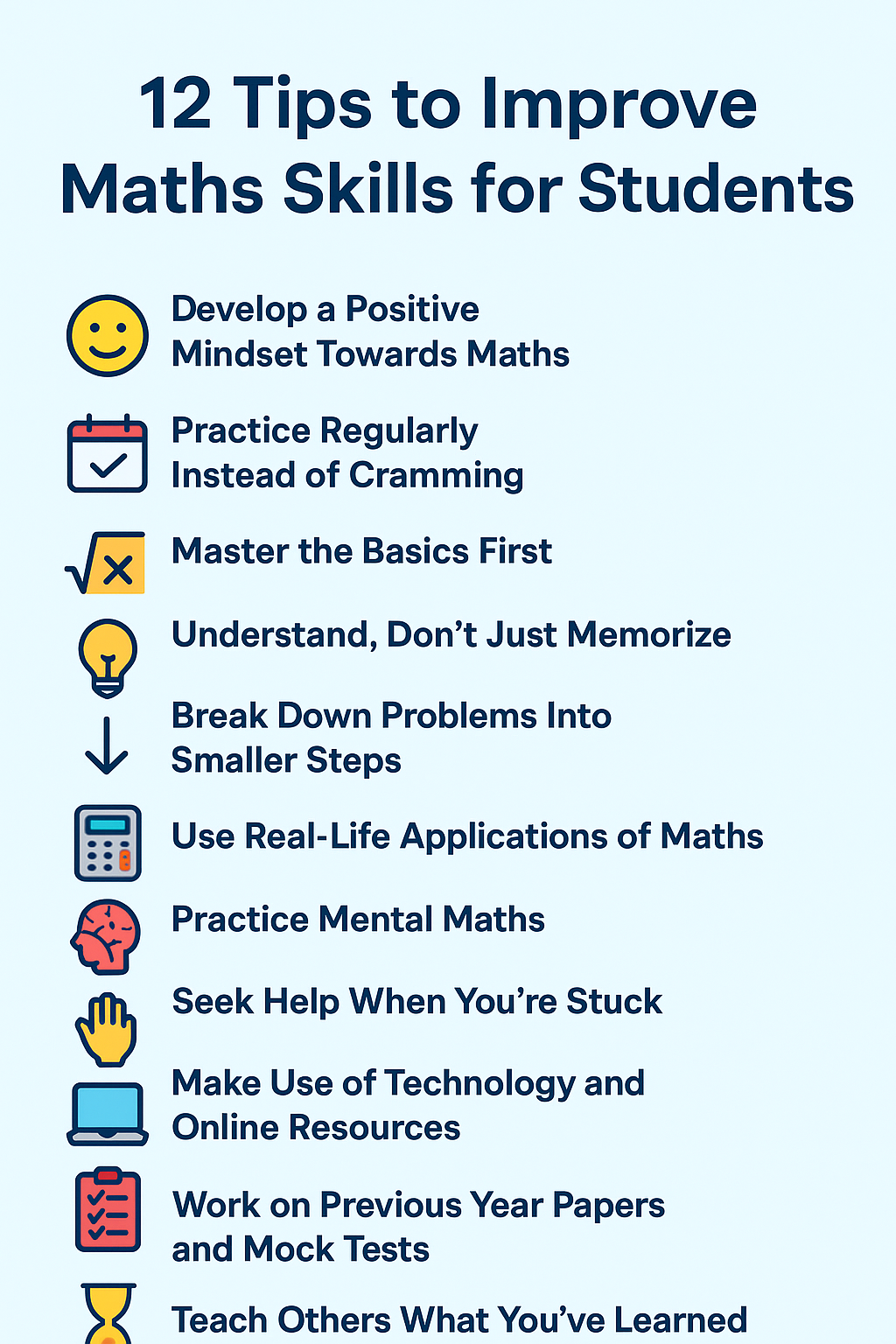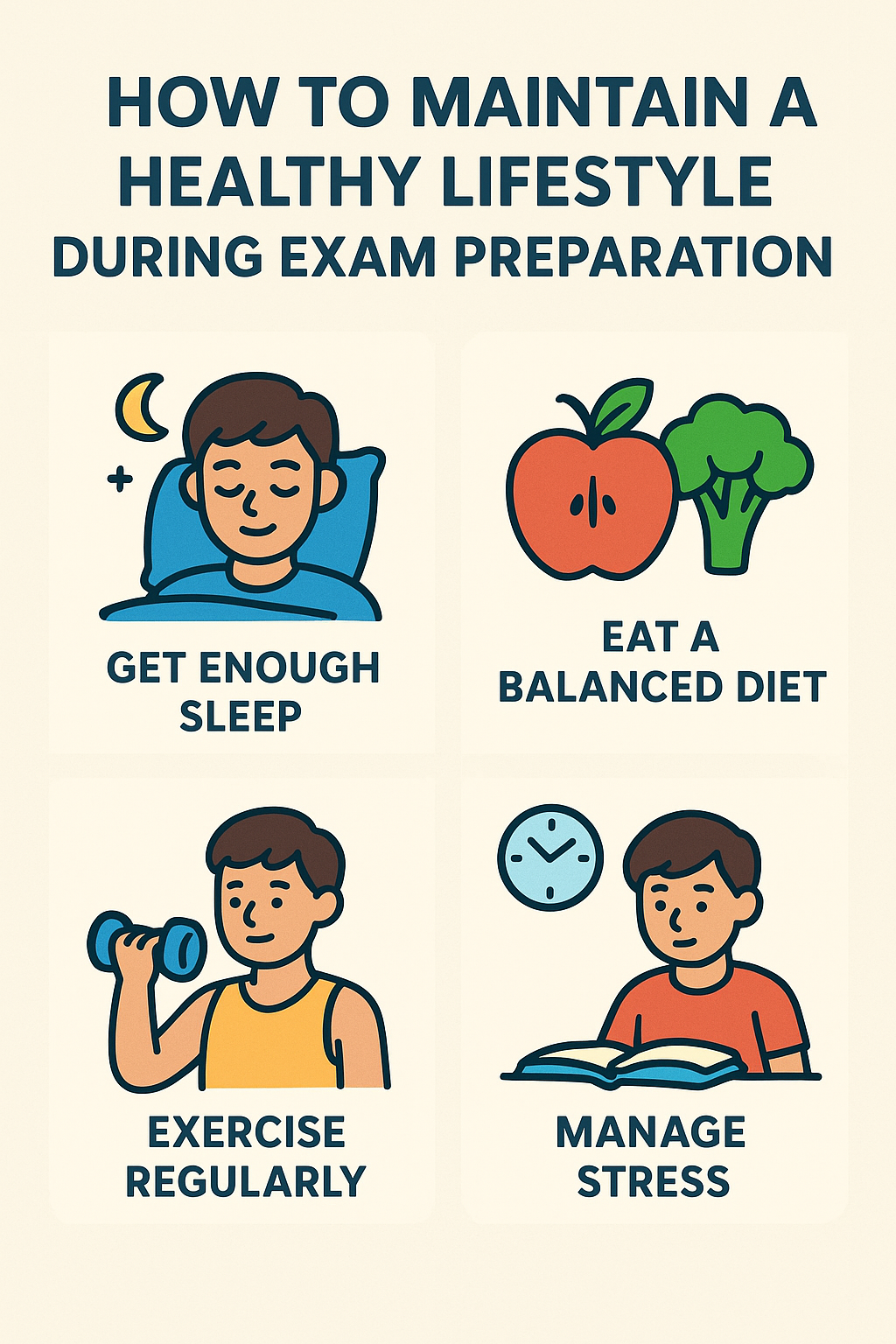12 Tips to Improve Maths Skills for Students

Tips to Improve Maths Skills for Students: Mathematics is typically seen as one of the most difficult courses in school, yet it is also one of the most important. Math plays an important role in our lives, from common tasks like budgeting and cooking to advanced applications in science, technology, and engineering. For many pupils, however, the subject might be intimidating. The good news is that arithmetic aptitude is more than just intrinsic talent; it can be improved with the appropriate tactics, persistent practice, and a positive attitude.
If you’ve ever struggled with numbers or felt apprehensive before a maths test, you’re not alone. Many students confront similar challenges, but with dedicated effort, anyone can gain confidence in their mathematical abilities. In this article, we’ll look at 12 practical ways to improve maths skills -12 Tips to Improve Maths Skills for Students and make learning more enjoyable and successful.
Table of Contents

Develop a Positive Mindset Towards Maths
Changing your perspective on maths is the first step towards enhancing your skills. Many pupils approach maths with trepidation, assuming that they are “just not good at it.” This negative self-talk causes unneeded mental blockages.
Instead, remind yourself that arithmetic is a skill, just like playing sports or learning a language, that gets better with practice. A growth mentality, which sees problems as chances to learn, can help you overcome irritation and gain confidence. Remember that making mistakes is a natural part of the learning process.
Practice Regularly Instead of Cramming
Mathematics is not a topic that can be mastered immediately. It demands regular practice over time. Instead of cramming for examinations, try to spend at least 20-30 minutes each day solving issues.
When you practise often, topics remain fresh in your mind, and you gradually improve your speed and accuracy. Just as muscles expand with frequent workouts, your brain sharpens with consistent mathematical practice.
Build a Strong Foundation-Tips to Improve Maths Skills for Students
A tall building cannot stand without a solid foundation, and the same is true for mathematics. Before moving on to more sophisticated areas such as trigonometry or calculus, be sure you understand the fundamentals of addition, subtraction, multiplication, division, fractions, and decimals.
For example, if you’re having trouble with algebra, it’s possible that you don’t comprehend basic arithmetic or negative numbers. Strengthening the basis will inevitably make advanced topics easier.
Connect Maths with Real Life
Many students complain, “Why should I study maths? “I will never use it in real life.” But the truth is that maths is everywhere!
- Percentages: Used while shopping during discounts.
- Ratios: Applied in cooking recipes.
- Geometry: Essential in home design, architecture, and art.
- Probability: Helps in decision-making and predictions.
Example Table:
| Concept | Real-Life Example |
|---|---|
| Fractions | Sharing a pizza among friends |
| Geometry | Calculating carpet area |
| Algebra | Budgeting monthly expenses |
| Probability | Predicting outcomes in sports |
When students see maths in action, it feels less like memorization and more like a life skill.
Understand, Don’t Just Memorize
One common mistake students make is memorising formulas and procedures without understanding the reasoning behind them. While memorisation has its uses, true mastery stems from comprehension.Tips to Improve Maths Skills for Students
Ask yourself questions such as:
- Why does this formula work?
- Is it possible to describe this idea in my own words?
- How does this apply in real life?
For example, rather than memorising a triangle’s area formula, consider how it connects to the area of a rectangle. This better knowledge helps you remember information for longer and handle challenges more creatively.
Break Down Problems Into Smaller Steps
Complex arithmetic problems might be scary since they appear overpowering at first glance. The idea is to divide them into smaller, more achievable steps.
For example, if you’re answering a word problem, first determine what the issue is asking, then write down the known facts, and finally apply the right formula or procedure step by step. This systematic approach lowers errors and boosts confidence.
Use Real-Life Applications of Maths
Math becomes more intriguing when it is applied to real-world circumstances. Try applying concepts to your daily activities:
- Calculate discounts and taxes while shopping.
- Measure the ingredients as you cook.
- Monitor your monthly expenses and savings.
- Arrange furniture in a room using geometry.
This will allow you to perceive arithmetic as a practical instrument that simplifies your life rather than abstract symbols on paper. This not only increases comprehension but also keeps you motivated.
Seek Help When You’re Stuck
It is absolutely common to become stuck on specific difficulties or concepts. Instead of being discouraged, seek help. Ask your teacher to explain the concept again, join a study group, or watch online tutorials that break down the subject step by step.
Sometimes hearing a different explanation helps things make sense. Don’t be scared to ask questions—many of your peers are probably perplexed as well, but are too afraid to ask.
Use Flashcards for Formulas
Flashcards are an excellent way to memorize key formulas. Write a formula on one side and its explanation or example on the other.
Sample Flashcard Table:
| Formula Type | Formula | Example |
|---|---|---|
| Area of Circle | πr² | r = 7 → 154 cm² |
| Pythagoras | a² + b² = c² | 3²+4²=5² |
| Simple Interest | (P×R×T)/100 | P=1000,R=5%,T=2 → ₹100 |
Reviewing flashcards regularly helps in quick recall during exams.
Make Use of Technology and Online Resources
We live in a digital age where countless resources are available at our fingertips. Educational apps, interactive websites, and video tutorials can make maths more engaging.
Platforms like Khan Academy, Brilliant, or YouTube channels provide visual explanations and practice exercises. Use math apps to practice quizzes or improve mental arithmetic. However, use technology as a learning aid, not a replacement for genuine problem-solving effort. Link
Group Study and Peer Discussions
Explaining a problem to a buddy can help you better grasp it. Group Studies:
- Encourage teamwork.
- Allow the exchange of various problem-solving strategies.
- Make learning less stressful.
For example, if you struggle with quadratic equations but your friend excels at them, you can help each other in geometry and algebra.
Also Read: Teacher Vs AI: Teachers Taught Us How to Learn, AI Teaches Us How to Ask
Work on Previous Year Papers and Mock Tests
Solving previous year’s question papers is incredibly useful while studying for exams. They include an overview of the exam pattern, frequently requested questions, and time management.
Mock examinations mirror real exam situations, allowing you to practise under pressure. After each test, carefully review your mistakes and determine where you went wrong. This targeted revision improves accuracy and confidence.
Teach Others What You’ve Learned
Explaining concepts to others is one of the most effective strategies to gain a deeper knowledge. Teaching forces you to clearly organise your thoughts and discover knowledge gaps.
Form a study group with your pals and take turns explaining different topics. You’ll be astonished at how much more confident you get after successfully teaching someone else.
Stay Consistent and Patient
Improving mathematical skills is a long process, not a sudden sprint. You may not notice results right away, but with regular practice and effort, development is inevitable.
Avoid comparing yourself to others; instead, concentrate on your personal development. Celebrate modest achievements, such as completing a previously difficult task. Over time, these tiny victories will add up to major progress.
Final Thoughts-Tips to Improve Maths Skills for Students
Mathematics is more than simply numbers and equations; it is about developing logical thinking, problem-solving abilities, and tenacity. By following these 12 suggestions, students can turn maths from a source of stress to a source of strength.
Remember:
- Maintain an optimistic attitude.
- Maintain a steady practice schedule.
- Concentrate on comprehending, not memorisation.
- Apply maths in real life.
- Seek help when necessary.
With patience, determination, and the appropriate tactics, anyone can improve their arithmetic skills and gain confidence in solving even the most difficult problems.
So, the next time you sit down to answer a mathematical issue, remind yourself that you’re not simply working on equations; you’re developing skills that will last a lifetime.




